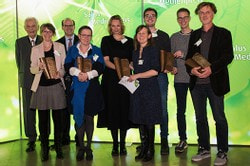On 10th October 2019 the winners of the 10th Salus Media Prize were announced at the official award ceremony in Munich. More than 200 invited guests from the political, economic and organic sectors were eager to know who the winners would be.
Salus managing director Dr. Florian Block opened the anniversary ceremony with special pride. He valued highly the work and the engagement of all applicants who stand up for a sustainable lifestyle and contribute to the public debate with their inspirational ideas and writings.
So far, the Salus Media Prize has been awarded 46 times to 52 winners between 23 and 67 years of age with a total prize money of €94,000. All guests were inspired by the continuously increasing importance of this prize bringing together people who stand up for a change in agriculture and alimentation and whose community is becoming bigger, more competent and influential.
The jury had the honour to choose the best five among over 80 applications.
First Prize (prize money €6,000, split in €3,000 each)
Due to the outstanding quality of the contributions the first prize was split and shared by Angela Lieber and Tatjana Mischke:
Angela Lieber: With her article “Wer blickt über den Tellerrand?” (Who looks beyond one’s own nose?) published in the newspaper “Der Freitag” she gives attention to the jurisdiction in case of genome-editing-methods like e.g. CRISPR/Cas. The agricultural sector is split with it’s view to the fields of application of this new technique. Does the new genetic technique hold the desired potential for global food safety in times of climate change? What does the leading decision of the European Court of Justice mean for small and medium-size plant breeders? And which challenges face society?
Tatjana Mischke: With her film “Wie schaffen wir die Agrarwende?” (How will we manage the agricultural change?) published by Thurnfilm, she questions the future of agriculture. So far, industrial agriculture has been assuring our alimentation and made it cheaper. But in the meantime even conventional farmers observe the side effects caused by the assumedly cheap cultivation of fruit and vegetables. The documentary accompanies farmers who by conviction or economic pressure are looking for alternatives to the industrial agriculture, and asks for the role of the consumers and EU-subventions.
Special Prize (prize money €1,000)
Eva Rosenkranz and Dr. Andreas Segerer: In their book “Das große Insektensterben” (The big insect deaths) published by oekom editorial, the authors claim that the extinction of species is not a problem of far-away countries but that also our own eco-systems are struggling: On our fields and in our gardens the bees, butterflies and beetles are dying. The entomologist Dr. Andreas Segerer explains the connections and shows what has to be done now. Eva Rosenkranz provides many practical tips and informs about initiatives that oppose the insect deaths – according to the motto: Let’s get started!
Prize for Young Journalists (prize money €2,000)
David Nelles and Christian Serrer: With their book „Kleine Gase – Große Wirkung” (Small gases – big effect), published by themselves, the two students wanted to get to the point of the climate change. With short texts, clear graphics and the support of more than 100 scientists they explain the causes and the consequences of the climate change.
Otto Greither Special Prize (prize money €1,000)
Berndt Welz: With his documentary film “planet e: Die Öko-Rebellen vom Himalaya” (planet e: The eco-rebels of the Himalaya) published by the German TV-station ZDF, the author tells about Sikkim in India: In 2010, the prime minister of Sikkim, a federal state of India located in the Himalaya region, set up an “organic mission”. For a good two years now, the complete agricultural surface is cultivated ecologically. Would this, what functions so well in the Himalaya region, also be possible in Germany? This is what Berndt Welz tries to find out in his documentary.
Since 2010 Salus honours critical journalistic reports about the negative consequences of genetic engineering in agriculture or about the chances that ecological agriculture without genetic engineering offers for the environment and for humankind.
